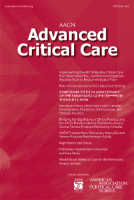
AACN Advanced Critical Care
Scope & Guideline
Connecting research and practice for superior patient care.
Introduction
Aims and Scopes
- Critical Care Nursing Practices:
The journal extensively covers best practices in critical care nursing, including patient assessment, management strategies, and innovative care models. - Ethics and Decision-Making in Healthcare:
A significant focus on ethical considerations and decision-making processes in critical care, particularly regarding patient autonomy, informed consent, and surrogate decision-making. - Interdisciplinary Collaboration:
The importance of teamwork and communication among healthcare professionals in critical care settings is a core area, highlighting strategies that enhance interdisciplinary collaboration. - Innovations in Technology and Care Delivery:
The journal explores advancements in technology such as telehealth, point-of-care ultrasonography, and the use of artificial intelligence in nursing practice. - Palliative and End-of-Life Care:
A consistent focus on integrating palliative care principles into critical care nursing, addressing the needs of patients with serious illnesses and their families. - Nurse Education and Professional Development:
The journal emphasizes the continuous education and professional development of nurses, including competency assessments and leadership training.
Trending and Emerging
- Telehealth and Virtual Care:
The rise of telehealth and virtual nursing solutions has become a prominent theme, particularly in the context of the COVID-19 pandemic, highlighting the need for innovative care delivery methods. - Mental Health and Well-Being of Nurses:
There is an increasing emphasis on the mental health and well-being of nurses, addressing burnout, moral injury, and the psychological impact of critical care work. - Palliative Care Integration:
The integration of palliative care principles into critical care settings is gaining attention, emphasizing the importance of holistic approaches to patient management. - Artificial Intelligence and Technology in Nursing:
The exploration of AI and technology in nursing practice is a growing area, with discussions around its application in electronic health records and predictive analytics. - Health Disparities and Equity:
Recent publications are increasingly addressing health disparities and the need for equitable care in critical settings, focusing on social determinants of health.
Declining or Waning
- Traditional Case Studies:
While case reports remain relevant, there has been a noticeable decrease in the publication of traditional case studies, as the journal shifts towards broader research themes and innovative practices. - Basic Nursing Skills and Protocols:
There appears to be a declining emphasis on basic nursing skills or protocols, as the journal increasingly focuses on advanced practice and complex care scenarios. - Single-Disease Focus:
Research centered on single diseases or isolated conditions has become less frequent, indicating a shift towards more integrated and holistic approaches to patient care. - Historical Perspectives in Nursing Practice:
Papers focusing on historical perspectives or retrospective analyses in nursing are less common, suggesting a move towards contemporary issues and forward-looking practices.
Similar Journals
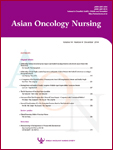
Asian Oncology Nursing
Empowering Oncology Nurses for a Healthier TomorrowAsian Oncology Nursing is a pivotal journal dedicated to advancing the field of oncology nursing across the Asian continent and beyond. Published by the esteemed Korean Oncology Nursing Society, this journal serves as a platform for researchers, clinicians, and educators to disseminate groundbreaking findings and innovative practices in cancer care and nursing. With an ISSN of 2287-2434 and E-ISSN 2093-7776, it is committed to enhancing the knowledge and skills of oncology nursing professionals, thereby improving patient outcomes. Although currently not operating as an open-access platform, the journal emphasizes the significance of bridging the research gap in oncology nursing, fostering collaboration among professionals in the field. Given the increasing importance of culturally competent care in oncology, Asian Oncology Nursing positions itself as an essential resource for those who strive to elevate standards of care and educate future generations of oncology nurses.
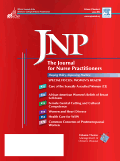
JNP- The Journal for Nurse Practitioners
Elevating Patient Care via Specialized Nursing Knowledge.JNP - The Journal for Nurse Practitioners is a leading publication in the fields of Advanced and Specialized Nursing, as well as Fundamentals and Skills, proudly published by Elsevier Science Inc. With an ISSN of 1555-4155 and an E-ISSN of 1878-058X, this journal provides a robust platform for disseminating innovative research and clinical insights relevant to nurse practitioners. With a respectable 2023 Scopus ranking placing it in the Q2 category for several key nursing disciplines, JNP serves as an essential resource for professionals seeking to stay at the forefront of nursing practice. The journal spans over a decade of impactful scholarship, converging years from 2005 to 2024, encouraging the advancement of knowledge and skills within the nursing community. Although currently not an open-access publication, it remains pivotal for researchers and practitioners dedicated to improving patient care and advocating for the nursing profession.
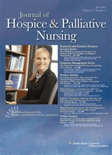
Journal of Hospice & Palliative Nursing
Advancing Compassionate Nursing Practices.The Journal of Hospice & Palliative Nursing (ISSN: 1522-2179, E-ISSN: 1539-0705), published by Lippincott Williams & Wilkins, stands as a leading resource in the field of hospice and palliative care nursing. With an impressive impact factor and ranked in the Q1 quartile for Advanced and Specialized Nursing and Q2 quartile for Community and Home Care as of 2023, this journal serves as a critical platform for disseminating evidence-based practices and innovative research. It covers a broad spectrum of topics, aiming to improve patient experiences and enhance the quality of care for individuals with life-limiting conditions. Created to support healthcare professionals, researchers, and students in the United States and beyond, the journal invites contributions that stimulate scholarly dialogue and advance the practice of palliative nursing. With publication years converging from 1999 to 2024, it remains an invaluable asset to the nursing community, fostering advancements in this vital area of healthcare.
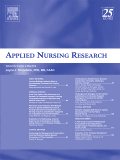
APPLIED NURSING RESEARCH
Fostering Innovation in Nursing Through Rigorous ResearchApplied Nursing Research is a premier journal dedicated to the dissemination of high-quality research within the nursing field, published by W B Saunders Co-Elsevier Inc. With an impact factor that places it in the Q1 category for Nursing (miscellaneous), this journal ranks 23rd out of 139 in its Scopus category, firmly establishing itself in the top percentile (83rd). Since its inception in 1988, Applied Nursing Research has provided a vital platform for sharing innovative findings that impact clinical practice and healthcare delivery. The journal serves as an essential resource for researchers, professionals, and students aiming to enhance their knowledge and application of nursing practices. While it does not offer open access, it remains a crucial publication for those seeking to explore contemporary nursing topics and research trends through a rigorous academic lens.

Recherche en Soins Infirmiers
Pioneering research for a brighter nursing future.Recherche en Soins Infirmiers, published by the ASSOC RECHERCHE & SOINS INFIRMIERS in France, offers a vital platform for sharing innovative research and insights in the field of nursing care. With its ISSN 0297-2964 and E-ISSN 2271-8362, this journal serves as an essential resource for healthcare professionals, researchers, and students alike, striving to advance nursing practices and improve patient care. Although it currently holds a Q4 ranking in the 'Medicine (Miscellaneous)' category and occupies a position of rank #468 out of 636 in the Scopus General Medicine category, it is dedicated to fostering scholarly communication and collaboration. The journal's scope reflects a comprehensive approach to nursing theories, practices, and innovations from the years 1996 to 2022, with ongoing publications anticipated for 2024. Despite the absence of an open access model, the journal continues to publish works that address pressing healthcare challenges, thereby contributing significantly to the advancement of nursing as a discipline.

Investigacion y Educacion en Enfermeria
Transforming healthcare education, one study at a time.Investigacion y Educacion en Enfermeria, published by Universidad de Antioquia, Facultad de Enfermería, stands as a pivotal open-access journal since 1983, contributing significantly to the field of nursing and healthcare education within Colombia and beyond. With its ISSN 0120-5307 and E-ISSN 2216-0280, this journal aims to foster the dissemination of high-quality research, aiming to enhance nursing practices and education aligned with a wide array of domains including Community and Home Care, Family Practice, Geriatrics, and Maternity and Midwifery. The journal's impressive performance in the 2023 Scopus rankings places it in the top quartiles in several categories, reflecting its importance and influence, particularly in Nursing and Health Sciences. By encouraging collaboration and dialogue among researchers, practitioners, and students, Investigacion y Educacion en Enfermeria aspires to serve as an essential resource for advancements in nursing education and service delivery, making vital contributions to the evolving landscape of healthcare.
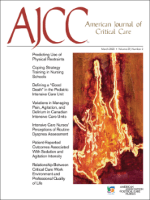
AMERICAN JOURNAL OF CRITICAL CARE
Advancing critical care through innovative research.Welcome to the American Journal of Critical Care, a premier publication dedicated to advancing the field of critical care nursing and enriching the understanding of critical care practices. Established in 1992 and published by the American Association of Critical Care Nurses, this journal serves as a vital resource for researchers, practitioners, and students alike, providing cutting-edge research, insightful reviews, and evidence-based practices that shape modern critical care. With an impressive impact factor and distinguished rankings—ranking in Q1 for Critical Care Nursing and Q2 for miscellaneous Medicine in 2023—this journal underscores its significance in the healthcare landscape. Although it does not currently offer Open Access, the American Journal of Critical Care remains committed to disseminating high-quality knowledge that drives innovation and improves patient care in critical settings. Join us as we explore the latest advancements and pivotal studies that influence patient outcomes and shape the future of nursing practice.

Clinical and Experimental Emergency Medicine
Transforming urgent care with impactful findings.Clinical and Experimental Emergency Medicine, published by the SEOUL KOREAN SOCIETY OF EMERGENCY MEDICINE, is a premier Open Access journal dedicated to advancing knowledge and practice within the fields of emergency medicine and emergency nursing. With an ISSN of 2383-4625 and an E-ISSN of 2383-4625, this journal has established itself prominently in the academic community, achieving a notable Q2 ranking in both Emergency Medicine and Emergency Nursing categories in 2023. The journal is committed to providing highly relevant research, innovative clinical practices, and educational resources that address the urgent and evolving challenges in emergency care. With a vision to foster collaboration among researchers, practitioners, and students, it aims to contribute significantly to the body of knowledge that enhances emergency medical services and improves patient outcomes globally. Accepting submissions and offering Open Access since its inception in 2014, the journal is positioned as a key resource for those dedicated to the advancement of emergency medicine.
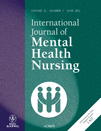
International Journal of Mental Health Nursing
Inspiring change through impactful mental health research.International Journal of Mental Health Nursing is a prestigious peer-reviewed journal published by WILEY, dedicated to advancing the field of mental health nursing. With an ISSN of 1445-8330 and E-ISSN 1447-0349, the journal serves as a vital resource for researchers, clinicians, and educators within the psychiatry and mental health sectors. Ranked in the top Q1 quartile and recognized as Rank #4 out of 45 in the Nursing - Psychiatric Mental Health category, it boasts an impressive 92nd percentile ranking in Scopus metrics, underscoring its influence and reach within the academic community. Emphasizing original research, systematic reviews, and innovative clinical practices, the journal aims to bridge the gap between theory and practice, ultimately enhancing mental health care. The journal’s commitment to disseminating high-quality research ensures that it is an essential publication for anyone engaged in the evolving landscape of mental health nursing.
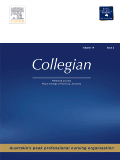
Collegian
Exploring the Frontiers of Nursing Science.Collegian is a distinguished academic journal published by Elsevier, focusing on the dynamic field of nursing. Launched in 1994 and continuing through to 2024, it aims to contribute to the advancement of nursing knowledge and practice. With an ISSN of 1322-7696 and an E-ISSN of 1876-7575, this journal has achieved an impressive standing, securing a Q2 category ranking within Nursing (miscellaneous) and positioning itself at #49/139 in the general nursing category on Scopus, with a commendable 65th percentile. The journal provides a platform for both established researchers and emerging scholars to share innovative research, case studies, and reviews that shape nursing education and practice. Although not open access, it remains widely recognized for its rigorous peer-review process and substantial contributions to nursing literature. As the profession evolves, Collegian stands out as a pivotal resource for professionals, educators, and students who seek to enhance their understanding and application of nursing science.